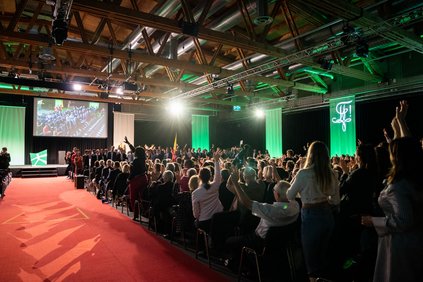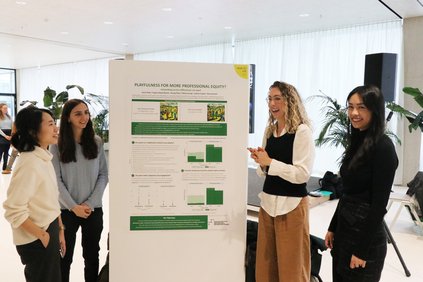Campus - 02.03.2023 - 13:33
HSG spin-off breeds insects with food waste
The HSG spin-off SmartBreed intends to use food waste which is now decomposing in biogas plants to breed insects. These will provide proteins for livestock fodder. In this way, proteins that have been produced regionally in an environmentally friendly way can replace soya in animal feed.

Black soldier fly larvae on human hand
Locally bred insects are intended to replace imported soya as a source of protein in animal feed: this is the idea behind SmartBreed, a spin-off of the HSG and of ETH Zurich. Since 2019, SmartBreed has been developing digitally monitored and controllable breeding facilities for a wide variety of in-sects. Until recently, an important line was constituted by mobile facilities with which poultry farms were able to breed grasshoppers and crickets as chicken feed. But in October 2022, the Confederation decided that feeding live insects to livestock is not permitted for the time being. “The decision took us by surprise. Looking back, though, it forced us to refocus,” says 26-year-old Patrik Bertschi, who set up SmartBreed with his brothers Christoph and Adrian.
Insects recycle food waste
Since the federal decision, the start-up has been fully committed to the development of breeding facilities for black soldier fly larvae and mealworms. In the breeding facility, the insects feed on by-products of the food industry, such as bran, the hulls of pulses, fruit waste and vegetable waste, as well as unsold food from the retail trade.
Once the insects are fully grown, they are processed into powder, which will serve as livestock feed. “We want to enable an as efficient as possible exploitation of waste materials from the food industry,” says Bertschi. After the waste materials have been recycled by the insects, the residue will be decomposed in biogas plants.
The locally produced insect protein can also replace part of the soya, which is an important source of protein in livestock feed today. According to the latest figures, Switzerland imported approx. 248,000 tonnes of soya in 2021, 79 per cent from Europe and 19 per cent from Brazil. The booming soya cultivation in Brazil in particular, is putting natural areas under pressure, and importing it causes CO2 emissions. “There’s a great potential for cutting CO2 production in Swiss agriculture. We’d like to contribute to this with locally produced animal feed,” say Bertschi.
Local breeding facilities reduce delivery trips
SmartBreed operates in a business area in which a great deal is in motion: in the EU, feeding pigs and poultry with processed insect protein has been permitted since late 2021. The Swiss Federal Food Safety and Veterinary Office is currently working on a relaxation of restrictions which should permit this as well. “We also hope that we’ll be granted an exemption from mid-2023 in order to test our insect protein as live-stock feed,” says Bertschi.
At present, SmartBreed is already conducting a feeding trial on laying hens to examine the in-fluence of insect feed as a protein source on eggs and animal welfare. “Initial results look promising,” says Bertschi. His start-up is funded by the Swiss Climate Foundation, as well as by VentureKick and Innosuisse.
In addition, the first breeding facilities are intended to be built directly on the food processing plants’ premises or in the vicinity of biogas plants this year. “Biogas plants receive large volumes of food production waste every day, which is why the construction of an insect breeding facility directly by the waste source makes sense,” says Bertschi. A Smart-Breed breeding facility in which the insects recycle the waste material measures about five by five metres and is eight metres high. “Our breeding facilities are therefore small, fa-vourably priced and quickly built in comparison with conventional insect breeding plants,” says Bertschi. To date, breeding facilities easily costing several million were centrally planned, which again entails delivery trips. “In contrast to this, we’d like to offer solutions that can be implemented locally.”
Encouragement of entrepreneurship at the HSG
Patrik Bertschi obtained a Bachelor’s degree in law from the HSG, his brother and co-founder Christoph a degree in business administration. “Studying law per se doesn’t have anything much to do with entrepreneurship. But the culture at the HSG is characterised by the fact that many students work alongside their studies.”
These early contacts with industry provide many valuable practical experiences, says Bertschi.
Also, SmartBreed went through the HSG’s Entrepreneurial Talents programme, which supports young entrepreneurs at the HSG with coaching sessions and a financial contribution. “This support was very valuable for us,” says Bertschi, who at the end of the programme in November 2022 was able to travel to the “start-up nation” Israel with further HSG founders. “The trip inspired me and also revealed to me where we can still develop further as a start-up.”
More articles from the same category
This could also be of interest to you
Discover our special topics
















